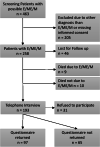Meningitis, meningoencephalitis and encephalitis in Bern: an observational study of 258 patients
- PMID: 34872509
- PMCID: PMC8647376
- DOI: 10.1186/s12883-021-02502-3
Meningitis, meningoencephalitis and encephalitis in Bern: an observational study of 258 patients
Abstract
Background: Depending on geographic location, causes of encephalitis, meningoencephalitis and meningitis vary substantially. We aimed to identify the most frequent causes, clinical presentation and long-term outcome of encephalitis, meningoencephalitis and meningitis cases treated in the Inselspital University Hospital Bern, Switzerland.
Methods: In this monocentric, observational study, we performed a retrospective review of clinical patient records for all patients treated within a 3-year period. Patients were contacted for a telephone follow-up interview and to fill out questionnaires, especially related to disturbances of sleep and wakefulness.
Results: We included 258 patients with the following conditions: encephalitis (18%), nonbacterial meningoencephalitis (42%), nonbacterial meningitis (27%) and bacterial meningoencephalitis/meningitis (13%). Herpes simplex virus (HSV) was the most common cause of encephalitis (18%); tick-borne encephalitis virus (TBEV) was the most common cause of nonbacterial meningoencephalitis (46%), enterovirus was the most common cause of nonbacterial meningitis (21%) and Streptococcus pneumoniae was the most common cause of bacterial meningoencephalitis/meningitis (49%). Overall, 35% patients remained without a known cause. After a median time of 16 months, 162 patients participated in the follow-up interview; 56% reported suffering from neurological long-term sequelae such as fatigue and/or excessive daytime sleepiness (34%), cognitive impairment and memory deficits (22%), headache (14%) and epileptic seizures (11%).
Conclusions: In the Bern region, Switzerland, TBEV was the overall most frequently detected infectious cause, with a clinical manifestation of meningoencephalitis in the majority of cases. Long-term neurological sequelae, most importantly cognitive impairment, fatigue and headache, were frequently self-reported not only in encephalitis and meningoencephalitis survivors but also in viral meningitis survivors up to 40 months after acute infection.
Keywords: Encephalitis; Meningitis; Meningoencephalitis; Sleep-wake disturbances; Tick-borne encephalitis.
© 2021. The Author(s).
Figures



